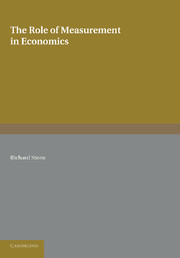Book contents
- Frontmatter
- Contents
- List of Tables
- List of Diagrams
- Preface
- INTRODUCTION
- FOUR ASPECTS OF THE PROBLEM OF MEASUREMENT
- SOME ILLUSTRATIONS OF THE PROBLEMS OF MEASUREMENT
- XIV Social Accounting
- XV The Three Forms of Economic Activity
- XVI Transactions in the British Economy in 1948: an Example
- XVII The Derivation of the Example from Published Sources
- XVIII The Structure of Transactions and Some Important National Aggregates
- XIX The Group Structure of Transactions
- XX Systems of Transactions from the Viewpoint of Accountancy
- XXI Statistical Design in Social Accounting
- XXII Market Demand from the Viewpoint of Economic Theory
- XXIII Other Influences to be Taken into Account
- XXIV The Formulation of Market Demand Relationships
- XXV Statistical Problems
- XXVI Demand Analyses for the United Kingdom
- XXVII Demand Analyses for the United States of America
- XXVIII The Sources Used in the American Analyses
XXVII - Demand Analyses for the United States of America
from SOME ILLUSTRATIONS OF THE PROBLEMS OF MEASUREMENT
Published online by Cambridge University Press: 05 June 2016
- Frontmatter
- Contents
- List of Tables
- List of Diagrams
- Preface
- INTRODUCTION
- FOUR ASPECTS OF THE PROBLEM OF MEASUREMENT
- SOME ILLUSTRATIONS OF THE PROBLEMS OF MEASUREMENT
- XIV Social Accounting
- XV The Three Forms of Economic Activity
- XVI Transactions in the British Economy in 1948: an Example
- XVII The Derivation of the Example from Published Sources
- XVIII The Structure of Transactions and Some Important National Aggregates
- XIX The Group Structure of Transactions
- XX Systems of Transactions from the Viewpoint of Accountancy
- XXI Statistical Design in Social Accounting
- XXII Market Demand from the Viewpoint of Economic Theory
- XXIII Other Influences to be Taken into Account
- XXIV The Formulation of Market Demand Relationships
- XXV Statistical Problems
- XXVI Demand Analyses for the United Kingdom
- XXVII Demand Analyses for the United States of America
- XXVIII The Sources Used in the American Analyses
Summary
For the United States of America over the years 1929-41 I have carried out demand analyses on a more extended plan with the aid of the series provided in the Survey of Current Business. Table 4 (at end) sets out in nearly all cases a number of analyses using different combinations of determining variables. The reason for this is not that each analysis is believed to be of equal interest and reliability as an expression of the demand relationship, but simply that by studying a number of equations for each commodity we can trace the influence of adding (or leaving out) variables in making demand analyses. In view of the frequent use of the regression of the amount demanded on income alone or on income and a trend it will be of particular interest to see how these combinations of variables work out in relation to other possible sets.
The conclusions to be drawn from this table may be summarized, in the order adopted in the last section, as follows.
(1) The Use of Untransformed Data
Most of the analyses shown here had been completed before the utility of using transformed series had been recognized. It was not thought worth while to recalculate the equations using first differences and so no justification can be given for the choice of untransformed variables. As will shortly be seen the residuals in the larger subsets at any rate show, on the average, values of von Neumann's ratio similar to those expected for random series of the same length. But this may be due to the ‘bias towards randomness’ discussed by Cochrane and Orcutt§ and does not ensure that the standard errors bear their usual interpretation and can be accepted as measures of reliability in the ordinary sense. However, the failure to use an appropriate transformation will mean not so much that the estimates of the regression coefficients will be biased as that we may, by calculating standard errors, mislead ourselves as to the accuracy of these estimates. Thus the regression coefficients may be of interest in themselves and the findings of the last section suggest that the standard errors may not be altogether unreliable.
- Type
- Chapter
- Information
- The Role of Measurement in Economics , pp. 75 - 80Publisher: Cambridge University PressPrint publication year: 2013



